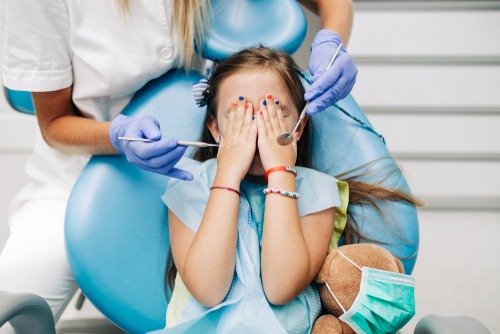How to Help Your Child Overcome Fear of the Dentist?
A visit to the dentist can be a source of anxiety for many children. The unfamiliar sounds, sights, and sensations often trigger fear, especially during early experiences. Parents play a key role in shaping how children perceive dental care, and helping them overcome fear begins long before the appointment. Establishing trust, using positive language, and creating calming routines can transform dental visits from stressful experiences into comfortable ones. By approaching the process with patience and understanding, parents can help their children feel safe, confident, and even curious about maintaining their oral health.
Understanding the Root of Dental Anxiety
Children’s fear of the dentist often stems from unfamiliarity and a lack of control. The bright lights, buzzing instruments, and the presence of strangers in masks can seem intimidating. Some fears may also come from hearing others describe painful or negative experiences, reinforcing anxiety before the child even steps into the clinic. Younger children, in particular, have vivid imaginations that can magnify these worries into larger fears. Understanding where this anxiety originates allows parents to address it effectively rather than dismissing it. Creating familiarity with dental visits through storybooks, videos, or pretend play helps children feel more in control of the experience. Parents can also model calm behavior by maintaining a positive attitude toward dental care. The goal is not to eliminate nervousness but to help children manage it confidently, recognizing that dental visits are a normal and beneficial part of growing up.
Creating Positive Associations with Dental Visits
The most effective way to reduce dental fear is by building positive connections early. Before an appointment, parents can introduce the idea of dental care in a fun and reassuring way—reading stories about friendly dentists or playing a game where the child examines a toy’s teeth can make the concept familiar and less intimidating. Visiting the clinic before the actual appointment allows children to become familiar with the environment without pressure. This early exposure can make the real visit feel routine rather than overwhelming. Praise also plays an important role; acknowledging bravery and cooperation reinforces confidence. A gentle approach from a Denver Pediatric dentist can further ease the process, as pediatric dental practices often use child-friendly language, colorful spaces, and calm communication styles that comfort young patients. When children associate dental care with kindness, patience, and encouragement, their anxiety gradually fades, giving way to trust and curiosity.
Modeling Calm and Confidence as a Parent
Children are remarkably perceptive and often mirror their parents’ emotions. If a parent approaches dental visits with visible stress or hesitation, a child may interpret the situation as something to fear. Maintaining a calm and positive demeanor helps communicate that the experience is safe and manageable. Talking about the dentist in a reassuring tone, avoiding words like “pain” or “hurt,” and instead focusing on “clean,” “strong,” and “healthy” creates a constructive narrative. Parents should also emphasize the purpose of dental care—to keep smiles bright and teeth strong—so that children understand its benefits rather than seeing it as a punishment or chore. During the visit, staying composed and supportive helps the child feel secure. Even small gestures, like holding their hand or offering an encouraging smile, can make a significant difference. By modeling confidence and patience, parents lay the foundation for a lifetime of positive dental experiences.
Introducing Dental Care Early
Familiarity reduces fear, and introducing dental care early in life helps normalize the experience. Scheduling a child’s first dental visit soon after their first tooth appears or by their first birthday establishes early comfort and routine. At this stage, appointments are brief and focused on gentle examinations, allowing children to get used to the sights and sounds of the clinic. Early introductions also enable parents to receive guidance on proper brushing techniques and diet for healthy teeth. Consistent checkups build familiarity, so the dentist becomes a regular figure rather than a stranger. By the time a child is old enough for more involved procedures, the experience feels natural instead of threatening. These early habits teach children that dental visits are simply another part of self-care, much like bathing or eating healthy foods. The earlier dental care becomes routine, the less room there is for anxiety to develop later.
Encouraging Communication and Expression
Encouraging children to express their fears is essential for helping them overcome them. Instead of brushing off their worries, parents should listen carefully and validate their feelings. Asking open-ended questions, such as “What makes you feel nervous?”, helps uncover specific concerns that can be addressed. For example, if a child fears the sound of dental tools, parents can explain what the noises mean and assure them that the tools don’t cause pain. Giving children choices, such as letting them hold a small toy during the visit or deciding which song to listen to on the way, can also provide them with a sense of control. Dentists can further support this by explaining each step before performing it, helping children feel prepared. Encouragement and honest communication build trust, allowing the child to approach dental visits with confidence rather than fear. The more they feel heard and involved, the more comfortable they become.
Turning Fear into Familiarity Through Routine
Consistency helps children overcome apprehension by transforming uncertainty into familiarity. Scheduling dental visits at regular intervals prevents long gaps that can heighten anxiety. Repetition allows children to build memories of calm, successful appointments. Pairing dental visits with positive activities—like going to a park afterward or choosing a favorite snack—helps reinforce good associations. Maintaining daily oral hygiene at home also builds confidence, as children who are comfortable brushing and flossing feel more secure about dental care in general. Familiarity creates predictability, and predictability reduces fear. When dental visits become a regular part of life, the anxiety surrounding them fades naturally over time. What once felt intimidating becomes simply another healthy habit that children accept and even take pride in. With patience and consistency, parents can help transform dental care from a fearful experience into a source of confidence and self-assurance.
Building Confidence Through Compassion and Routine
Helping a child overcome fear of the dentist is a gradual process that thrives on patience, understanding, and positive reinforcement. By introducing dental care early, modeling calm behavior, and creating supportive experiences, parents help shape lasting comfort and trust. Communication, familiarity, and encouragement all play critical roles in replacing fear with confidence. When children see the dentist as a caring partner rather than a source of fear, they develop lifelong habits that protect their health and well-being. Overcoming dental anxiety is not about eliminating fear instantly but about nurturing resilience and comfort one visit at a time—building smiles filled with both strength and confidence.






